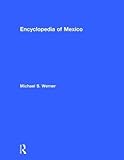Encyclopedia of Mexico: history, society and culture / editor Michael S. Werner
Werner, Michael S [editor].
Tipo de material: Libro
impreso(a)
Editor: Chicago, Illinois, United States: Fitzroy Dearborn, 1997Descripción: 2 volúmenes : retratos, mapas.ISBN: 1884964311.Tema(s): DiccionariosDescriptor(es) geográficos: México
Libro
impreso(a)
Editor: Chicago, Illinois, United States: Fitzroy Dearborn, 1997Descripción: 2 volúmenes : retratos, mapas.ISBN: 1884964311.Tema(s): DiccionariosDescriptor(es) geográficos: México | Tipo de ítem | Biblioteca actual | Colección | Signatura | Estado | Fecha de vencimiento | Código de barras |
|---|---|---|---|---|---|---|
| Enciclopedias |
Biblioteca Villahermosa
Texto en la configuración de la biblioteca Villahermosa |
Acervo General | C 972.003 E53/V.2 | Disponible | ECO050001876 | |
| Enciclopedias |
Biblioteca Villahermosa
Texto en la configuración de la biblioteca Villahermosa |
Acervo General | C 972.003 E53/V.1 | Disponible | ECO050001875 |
Women´s status and occupation: 1910-1996 Esperanza Tuñón Pablos páginas 855-859 Mexican revolution: February 1913-October 1915 Esperanza Tuñón Pablos páginas 1626-1629
The Encyclopedia of Mexico is a collaborative project involving more than three hundred scholars in seven countries. Nurturing scholarly dialogue across disciplinary and national boundaries, the Encyclopedia seeks to encourage new approaches to the study of Mexican history, society, and culture. The Encyclopedia also seeks to provide students, policy makers, and the general public with convenient access to basic bibliographic and factual data on historical figures, events, and processes, and it is designed to be a useful component for courses on Mexico in the social sciences and humanities. Although the authors working on this project include many of the top scholars in the field, articles have been selected, written, and edited with a nonspecialist readership in mind. Similarly, it was decided that a straight alphabetical format would be most useful for making basic information accessible to nonspecialist readers. Although the primary focus is on longer synthetic articles, the Encyclopedia also includes supplementary articles on specific historical events, figures, and institutions that, in the judgment of the editorial committee, played a particularly important role in Mexican history and were not (or could not be) discussed adequately in the broader synthetic essays. eng
Key discussions, debates, and themes have been highlighted in a number of ways. First, all topical articles have been extensively cross-referenced, although in the interest of space cross-references generally are confined to topical essays dealing with subjects specifically addressed in the original essay; readers also are encouraged to consult the general synthetic essays and biographical articles. The Encyclopedia also includes a detailed thematic outline that traces some of the more complex relationships among article topics. Finally, bibliographies have been organized around works that I believe are most useful to nonspecialist readers. This often was a difficult decision to make, whether I faced a paucity of material or an embarrassment of riches. Where possible, priority was given to English-language sources accessible to nonspecialist readers. Although I have consulted with authors in compiling bibliographies, the final decision rested with the staff at Fitzroy Dearborn and myself. The Encyclopedia of Mexico is primarily historical in scope, emphasizing the development of broad themes, structures, and processes over time. Not only does this focus allow a more richly contextual understanding of specific events, institutions, and figures in Mexican history, it also helps foster a deeper understanding of contemporary Mexico. The Encyclopedia includes topics that have been hotly debated for decades or even centuries, as in the case of Guadalupanismo, as well as topics that have emerged from more recent revisionist tendencies in Mexican studies. Indeed, many of the long sections on such topics as urbanism, population, and gender may represent the first real attempt at this sort of historical synthesis. Many articles on more specific topics draw on years of primary research to break new ground. eng
Like any pedagogical enterprise, however, the Encyclopedia of Mexico seeks to raise questions as much as provide information. Article topics were selected in consultation with members of the editorial committee, with additional input from authors and the broader scholarly community. There seemed to be a consensus that long synthetic essays focusing on broad historical questions would allow authors greater latitude to develop their ideas and challenge readers. We felt that an intellectually honest reference work simply could not cultivate an anonymous authoritative voice, and that it would need to highlight key disagreements and debates rather than eliding them. eng
This strategy-together with the Encyclopedia's multinational, multidisciplinary authorship-allows the Encyclopedia of Mexico to mitigate, if never entirely avoid, some of the key hazards of the encyclopedic project. The very idea of the encyclopedic compendium of knowledge was a key part of the ideological project of the European Enlightenment and the second wave of European colonialism, as the early enciclopedistes of the eighteenth and nineteenth centuries sought to map categories of division and hierarchy that they understood to be European, modern, and white onto "dark" continents, "dark" races, "dark" classes, "dark" ages in history-even the dark interior spaces of the body. Indeed, it was against this backdrop that the enciclopedistes helped constitute individuals, nations, and the continent of Europe itself as historical subjects. In quite different ways, latter-day encyclopedias also have at once responded to and helped define the ideological projects of metropolitan elites. The Encyclopedia of Mexico's emphasis on synthetic historiographic essays allows authors greater freedom to question the very categories that inform the organization of this project. Nonetheless, many of the most difficult and important questions will have to be asked by the readers themselves. eng
